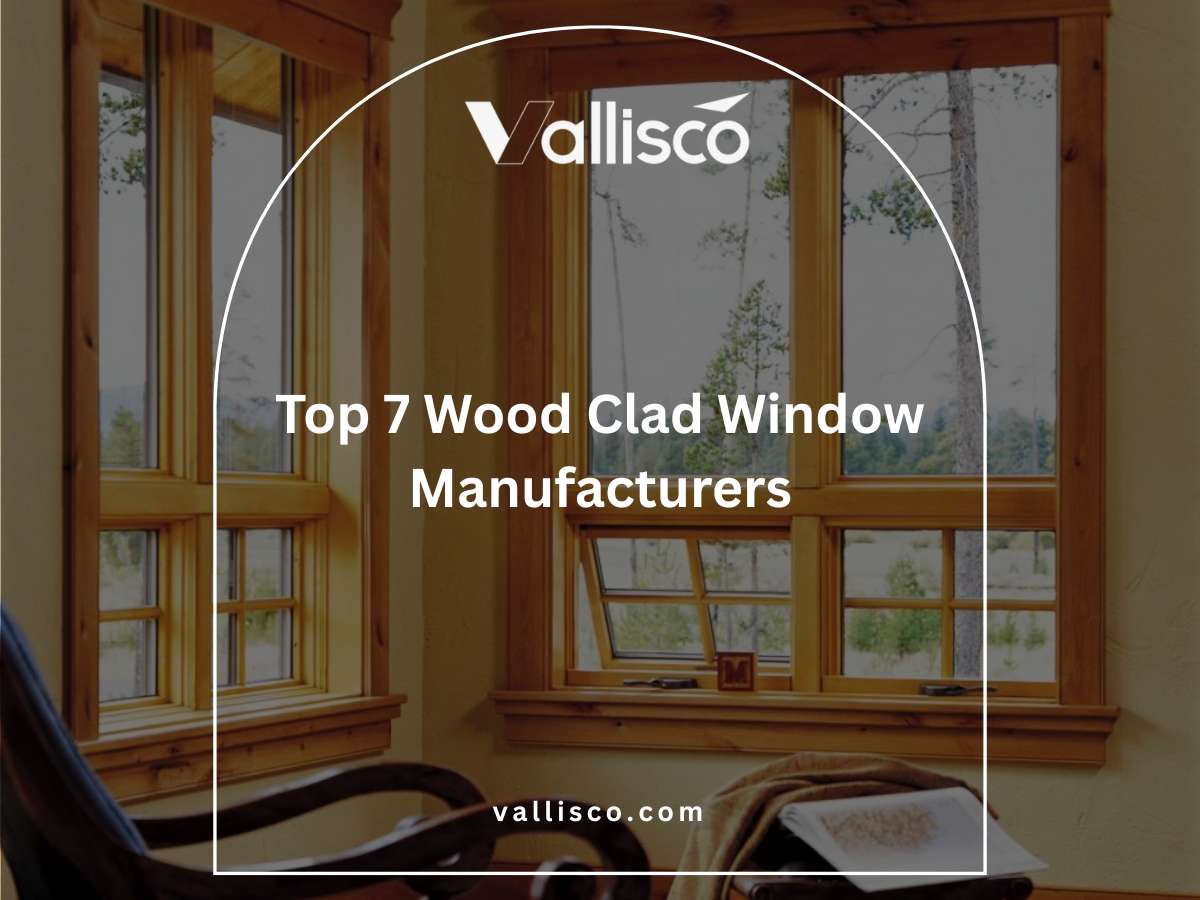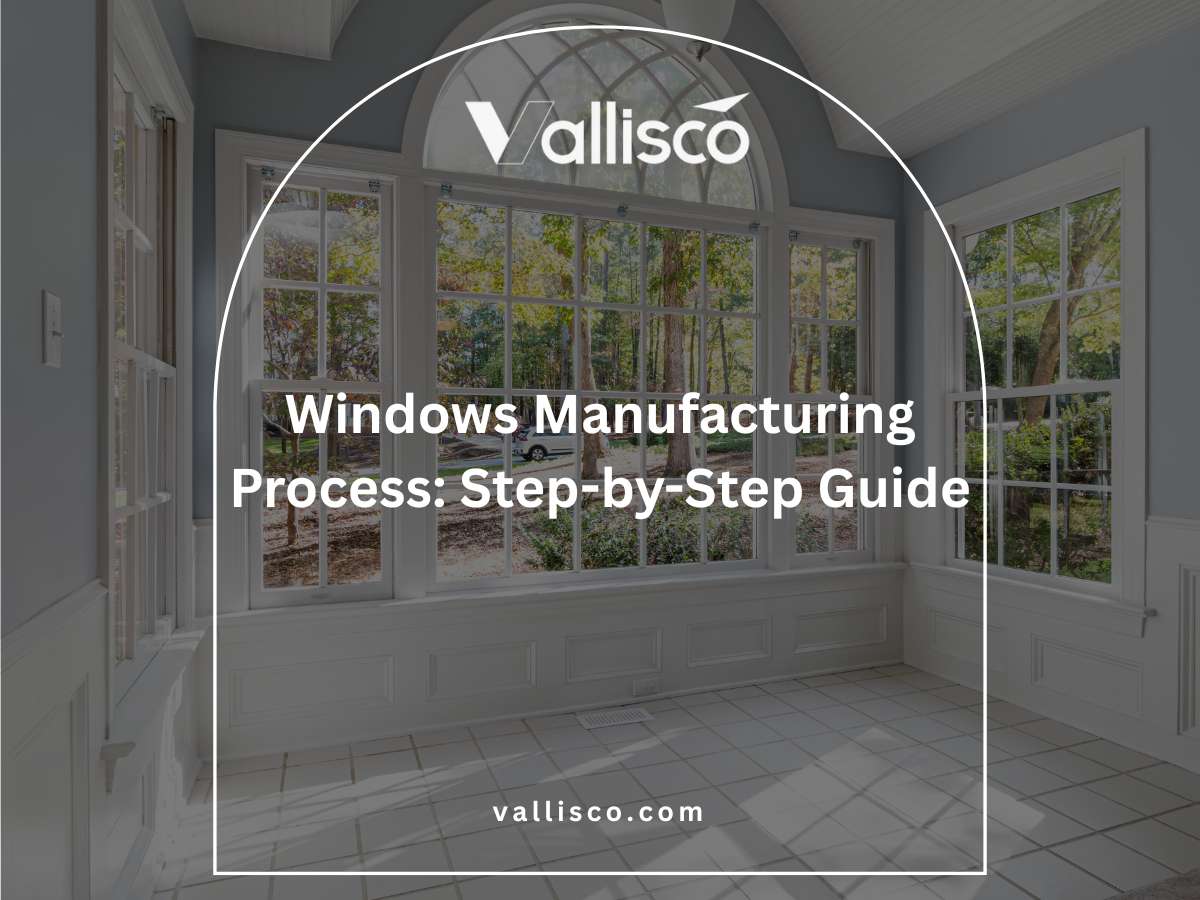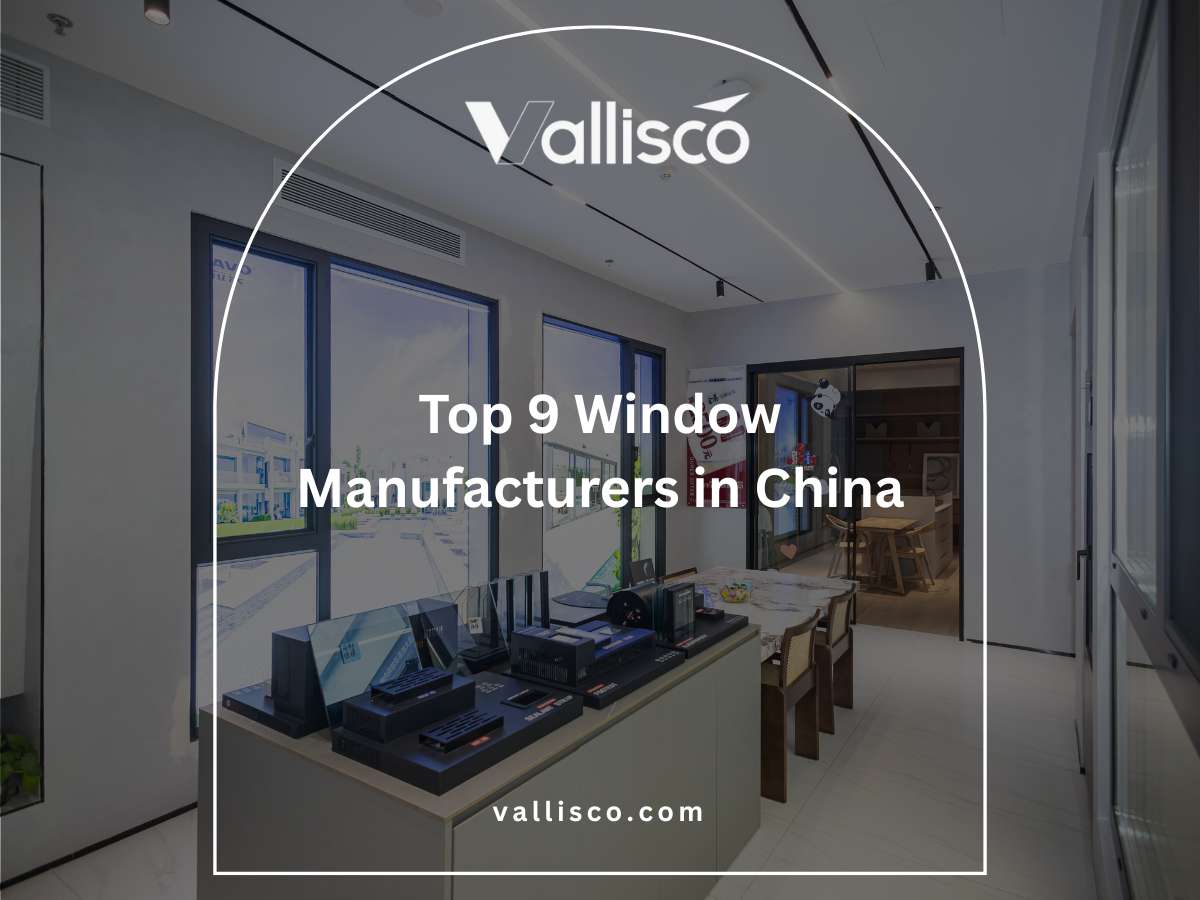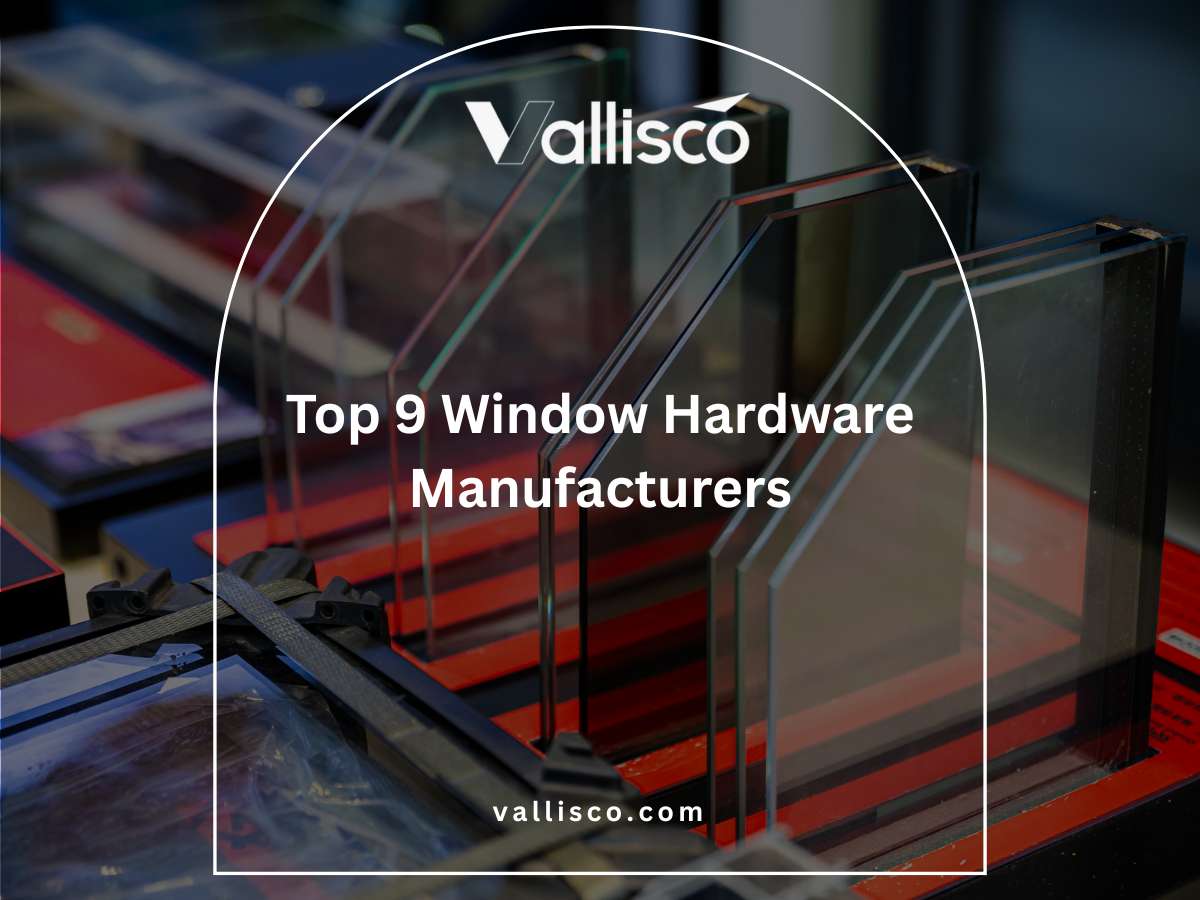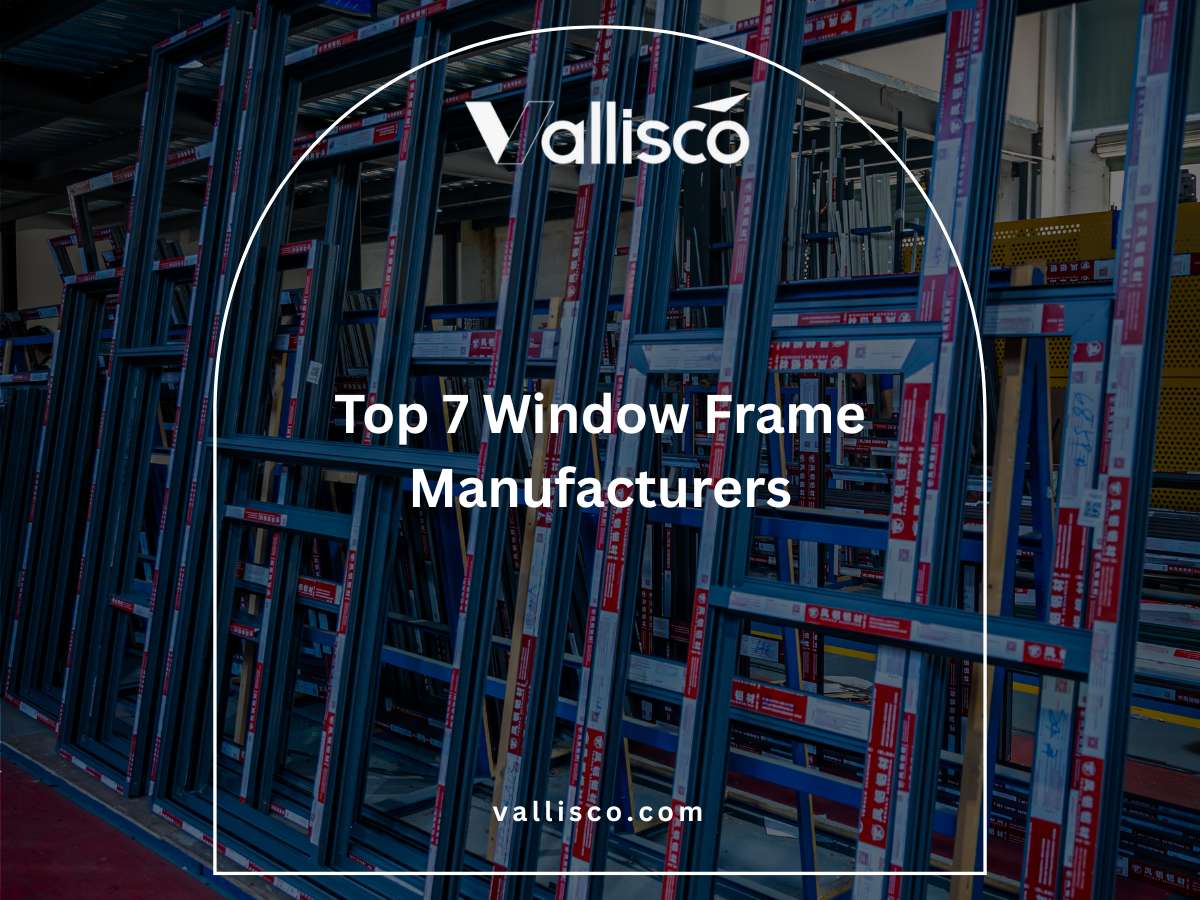A villa owner once told me how her glass bifold doors brought in more light and gave her guests a better view. She said bookings went up because the rooms felt brighter and more open.
Her story shows how the right door can do more than just open and close.
I work with property owners and engineers across Asia and Europe. My role is to guide them to practical, long-lasting choices for doors and windows.
In this article, I’ll walk you through what matters most when buying commercial bifold doors. You’ll see how they work, what benefits they bring, and what to check before placing an order.
The right choice can improve your property in ways you might not expect.
Let’s get started!
1. What Are Commercial Bifold Doors?
Commercial bifold doors are doors that fold in sections and slide neatly to the side. Instead of taking up space like swing doors or sticking like old sliders, they stack flat. This makes them practical for busy spaces where every inch matters.
I’ve worked with hotels and villas that struggled with heavy doors blocking walkways. Once they switched to bifold doors, the rooms felt open and guests moved around more easily. You’ve probably seen them in restaurants, greenhouses, or lobby areas. They let in light, save space, and connect indoors with outdoors in a clean way.
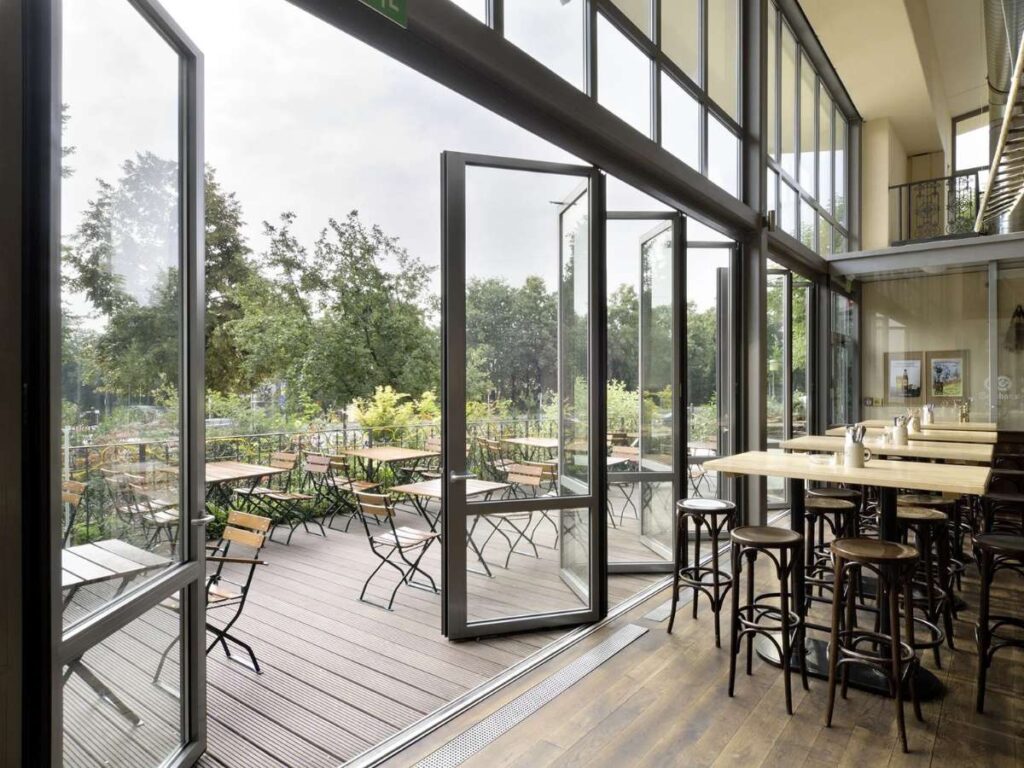
2. Benefits of Installing Commercial Bifold Doors
Bifold doors do more than just open and close. They can change how a property feels and how well it works for guests or residents. Below are some of the main benefits for businesses that install them.
Better Use of Space
One of the biggest advantages is the way these doors fold neatly to the side. Unlike swing doors, they don’t block walkways or furniture. This matters in hotels, villas, or restaurants where every square meter counts. Spaces immediately feel larger and easier to use once bifold doors are installed.
More Light and Connection
Glass bifold doors bring in natural light and give guests a clear view of the outdoors. That simple change can make a big difference in guest satisfaction. The villa owner I mentioned in the introduction noticed more bookings after replacing her old doors with bifold ones. People felt more relaxed in bright, open spaces.
Flexibility for Business Needs
These doors work well in many settings. They can be opened fully to connect indoor and outdoor areas, or partly closed when more privacy or climate control is needed. This flexibility is valuable during busy seasons, events, or even day-to-day operations. It gives property owners options without the need for major changes.
3. Materials Used to Make Bifold Doors
Choosing the right material is just as important as the style of the door. Each option has different strengths, and the best choice depends on your property, budget, and long-term plans. Below are the most common materials used for commercial bifold doors.
Aluminum
Aluminum is one of the most widely used materials for bifold doors. It is light but strong, which makes it easier to operate in larger openings. The frame resists rust and handles humid or coastal climates better than many other materials.
Another advantage is that aluminum can be made into slim profiles, allowing for larger glass panels. This brings in more light and creates a clean, modern look that fits well in hotels, villas, and restaurants. Many businesses also choose it because it requires less upkeep over time.
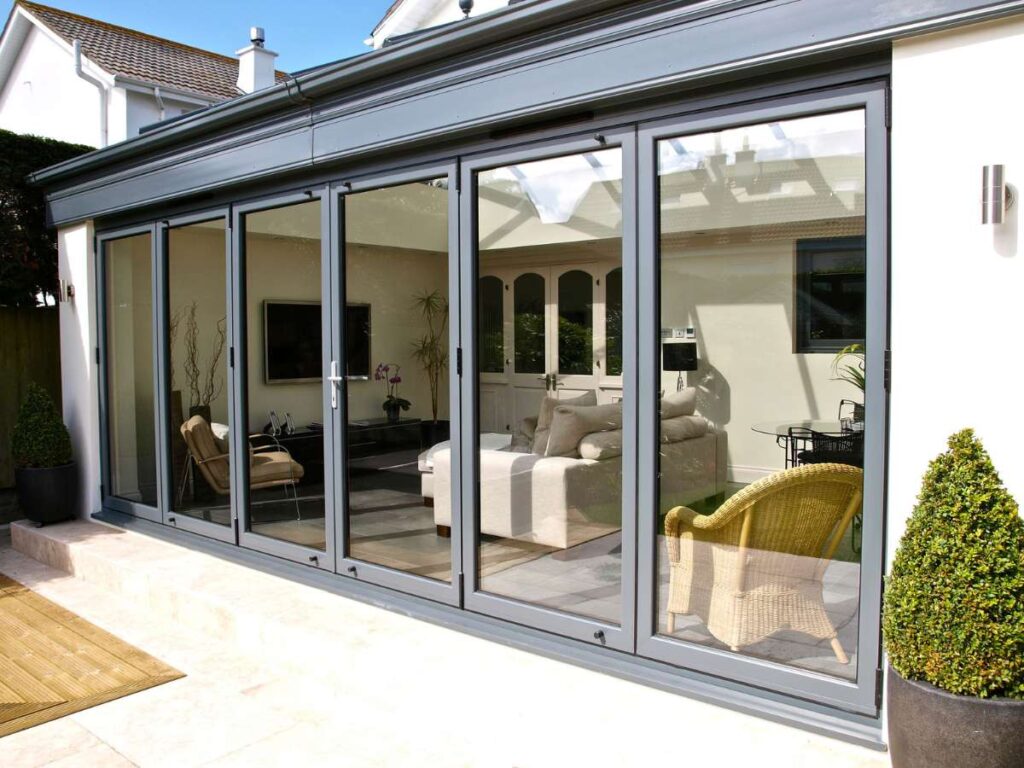
Timber (Wood)
Wood gives bifold doors a warm and natural appearance. It adds character to a property and can make villas, guesthouses, or inns feel more inviting. The trade-off is that wood needs more care. Without regular sealing or painting, it can warp, crack, or attract insects.
Some property owners are willing to invest in that upkeep because the charm of timber is hard to match. When used in the right setting, timber bifold doors can become a highlight of the space.
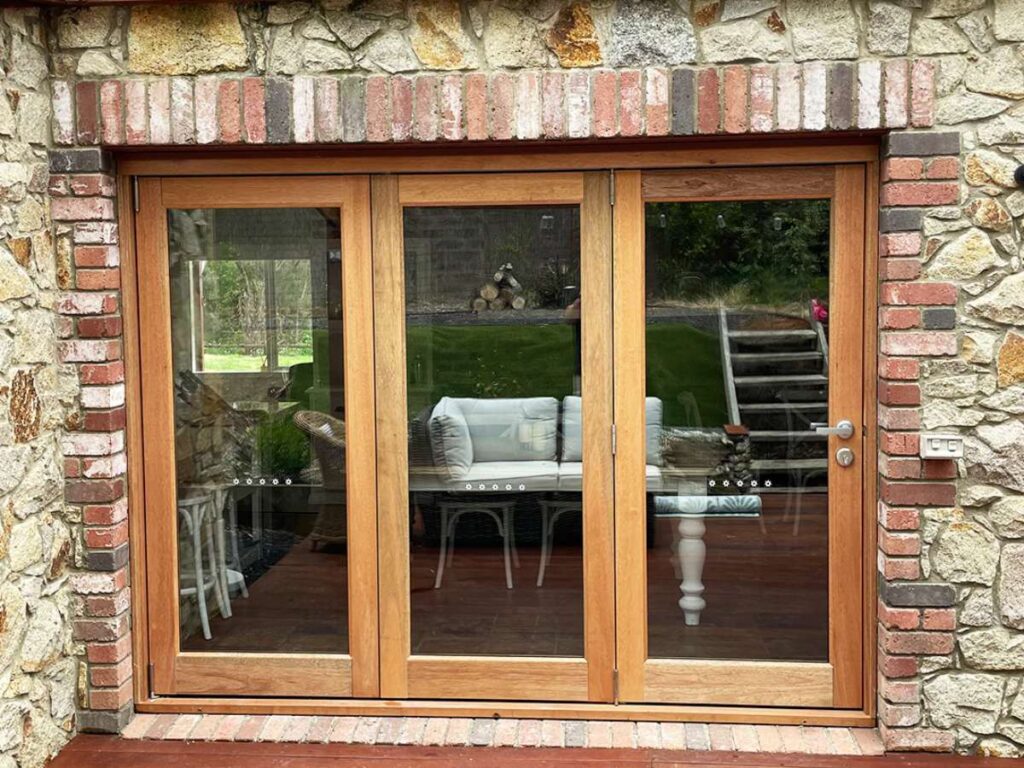
uPVC
uPVC is often chosen for its cost benefits. It is more affordable than wood or aluminum, but it still performs well in many commercial settings. This material insulates better than metal, which helps control indoor temperature and lower energy bills.
While it is not as strong as aluminum, it works well for smaller openings or properties looking for a balance between price and performance.
uPVC also resists rust and rot, making it easier to manage in the long run. For projects that require replacing several doors at once, this option helps keep costs under control without losing too much in quality.
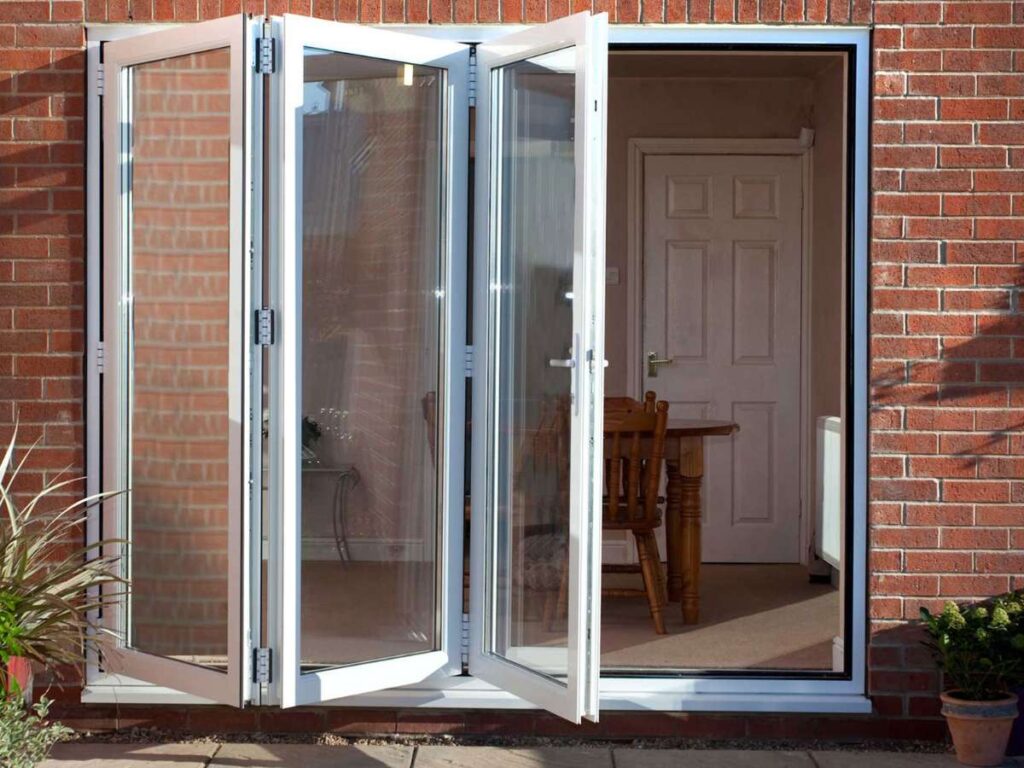
Glass Panels
Glass is the defining feature of most bifold doors. Large glass panels bring in sunlight, open up views, and make rooms feel more spacious. The right type of glass can also improve energy efficiency, block noise, and increase safety.
I’ve seen glass bifold doors transform the atmosphere in guest rooms by making them brighter and closer to nature. The property felt larger and more open without needing a major remodel. Paired with the right frame material, glass panels can raise both the look and value of a property.
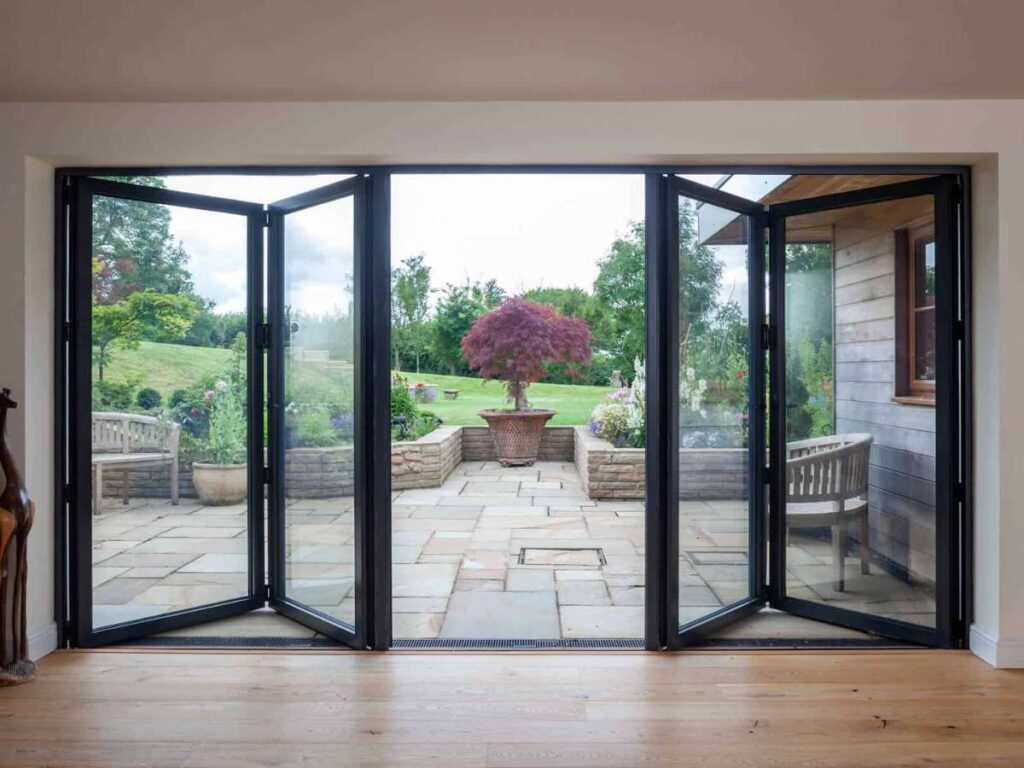
4. Types of Commercial Bifold Doors
There are different types of bifold doors, each made for specific needs. I’ve worked with property owners who chose one style over another because of space, climate, or guest experience. By looking at the options below, you’ll see which type makes the most sense for your property.
| Type | Description | Key Points | Best For |
| Aluminum Bifold Doors | Light but strong, with slim frames and large glass panels. | Low maintenance, resists rust, modern look. | Hotels, villas, restaurants, and coastal areas. |
| Timber Bifold Doors | Natural wood frames that bring warmth and character. | Needs regular sealing, higher upkeep, adds charm. | Guesthouses, inns, or villas with a classic style. |
| uPVC Bifold Doors | Affordable option with decent insulation. | Cost-friendly, resists rust, less strong than aluminum. | Smaller openings, projects with multiple replacements. |
| Glass-Only Bifold Systems | Large glass panels with minimal framing. | Brightens rooms, connects indoors and outdoors, depends on strong glass quality. | Greenhouses, lobbies, and spaces needing light and views. |
| Commercial Grade Heavy-Duty Systems | Built for frequent use and high traffic. | Strong hardware, longer lifespan, higher upfront cost. | Hotels, event spaces, and restaurants. |
| Internal Bifold Doors | Installed indoors to separate rooms or sections. | Saves space, easy to adjust room function, lighter materials. | Hotels, offices, or villas needing flexible layouts. |
Each type of commercial bifold door serves a different purpose. Your choice depends on how you want to balance durability, style, budget, and guest experience.
5. Key Features to Look For
Before you decide on commercial bifold doors, it helps to know which features matter most. I’ve worked with owners who focused on the wrong details and later regretted it. To help you avoid the same problem, here are the key features I recommend paying attention to:
Frame Quality
- Strength and Durability: A strong frame will last longer and handle daily use better. Aluminum is often chosen because it holds up well in busy properties.
- Weather Resistance: In humid or coastal areas, rust can be a big issue. Frames built with the right coating can save you from constant repairs.
- Maintenance Needs: Some frames need more care than others. For example, wood requires sealing while aluminum is much easier to maintain.
Glass Options
- Energy Efficiency: Double or triple glazing can cut down energy costs. This matters if you run a villa or hotel where temperature control is important.
- Safety and Security: Toughened or laminated glass reduces risks. It keeps guests safe and adds extra protection against break-ins.
- Noise Reduction: Quality glass can block outside noise. If your property is near a road or in a busy area, this feature improves guest comfort.
Hardware and Operation
- Smooth Track System: Doors that glide easily leave a better impression. I’ve seen businesses deal with guests frustrated by doors that stick or jam.
- Locking Mechanism: A solid lock system gives both you and your guests peace of mind. Multiple locking points add more security.
- Handle and Finish: Hardware should match the appearance of your property. It might seem like a small detail, but it adds to the overall design.
6. Cost Considerations
Buying commercial bifold doors is an investment. The price will vary depending on size, material, and features. I’ve worked with property owners who tried to cut costs at the start but ended up paying more later. To help you avoid that, here are the main cost factors to think about:
Material and Build Quality
The material of the door is one of the biggest factors in price. Aluminum usually costs more upfront but lasts longer with less upkeep. Timber can be more expensive to maintain, even though it adds charm.
uPVC is cheaper but may not be as strong for heavy use. I’ve seen hotels regret choosing cheaper options when repairs became too frequent. In the long run, a stronger material often saves money.
Installation and Labor
The cost of installation is not just about putting the door in place. It includes skilled labor, hardware setup, and sometimes structural adjustments. A poorly done installation can lead to problems like drafts, leaks, or stuck doors.
That’s why I always suggest working with experienced installers who know how to handle large commercial openings. It may look like an extra cost at first, but it prevents bigger bills later. Good installation is worth every dollar.
Long-Term Value
When you look at cost, think beyond the initial price tag. A well-chosen bifold door can reduce maintenance costs, improve energy efficiency, and even attract more guests. I’ve seen properties where adding glass bifold doors made rooms brighter, and bookings increased.
That return on investment matters for hotels and villas where guest experience drives revenue. Paying more upfront can actually bring in more value over the years.
7. Choosing the Right Supplier
The supplier you work with matters just as much as the door itself. A reliable partner helps you avoid problems and saves you money in the long run. Here are the main things to check before making your choice:
Experience in Commercial Projects
Not all suppliers handle commercial needs the same way. Look for a supplier who has worked with hotels, villas, and guesthouses before. They’ll understand the demands of properties that see frequent use.
Vallisco’s experience also means they can guide you on what works and what fails in real settings. A supplier with the right background reduces your risk of costly mistakes.
Product Range and Options
A good supplier should offer more than one style or material. If they only push one type of bifold door, you might not get what’s best for your property. The ability to compare aluminum, timber, uPVC, and glass systems in one place makes decision-making easier.
It also shows that the supplier can adapt to different budgets and design needs. More choice means you’re less likely to settle for something that doesn’t fit.
After-Sales Support
Support doesn’t stop once the doors are delivered. Installation advice, warranty coverage, and spare parts are all part of good service. A supplier that offers strong after-sales support gives you peace of mind.
If something goes wrong, you won’t be left handling it alone. I’ve seen property owners regret working with suppliers who disappeared after the sale, leaving them with repair bills they didn’t expect.
Proven Track Record
One thing I always recommend is checking reviews or past projects. When I helped the villa owner from my earlier story, she chose a supplier with a strong track record, and it made the process smoother.
Testimonials, case studies, or even site visits show you if a supplier delivers on their promises. Real examples carry more weight than sales brochures. A supplier with proven results is more likely to help your property succeed.
8. Considerations Before Buying Commercial Bifold Doors
Before placing an order, it’s important to step back and look at the bigger picture. A bifold door can change how a property works, but only if the choice matches your real needs. Here are a few key points to think through before you buy:
Space and Layout
The layout of your property plays a big role in how bifold doors will function. You’ll need enough room for the panels to stack when fully opened. This means checking both inside and outside areas to avoid blocking walkways or furniture.
In smaller properties, even a few centimeters make a difference. Careful planning at this stage prevents issues after installation. Vallisco, with commercial experience can help you assess space requirements.
Climate and Environment
The local climate affects which material and glass type will perform best. In humid or coastal regions, aluminum is usually the safer option because it resists corrosion. Timber, while attractive, may require more upkeep in such environments.
If your property is in a colder region, insulated glass can help cut heating costs. Thinking about the environment early saves you from higher maintenance bills later. Your doors should work with your surroundings, not against them.
Guest and User Experience
I always remind clients to think about the people who will actually use the doors. For a villa or hotel, this means guests opening and closing them daily. Smooth operation, easy locks, and natural light all affect how your space feels.
The villa owner I mentioned in the introduction saw more bookings because her guests loved the brighter rooms. A positive guest experience is not just about comfort—it also supports your business goals.
Budget and Long-Term Value
It’s easy to focus only on the upfront price, but long-term value is just as important. Cheaper materials or poor installation may cost less now but lead to repairs later. A higher-quality option often pays for itself through durability, lower maintenance, and better energy efficiency.
You should also think about how the doors contribute to guest satisfaction, which impacts revenue. Balancing budget with value ensures your investment works for years to come.
Conclusion
The villa owner I mentioned earlier saw brighter rooms and happier guests after installing bifold doors. That simple change improved her bookings and showed the real impact of choosing the right system.
In this guide, you’ve learned about materials, types, features, and costs—everything you need before making your choice.
The next step is yours.
A well-planned investment can save you money and improve guest experience at the same time. Vallisco manufactures reliable commercial bifold doors for projects just like yours.
Don’t wait until old doors hold your business back. Contact us today!
Learn More: Recommended Reads
Want to see more products? We’ve got plenty of options that might just be the perfect fit for you:
Still haven’t found what you’re looking for? Don’t hesitate to contact us. We’re available around the clock to assist you.


